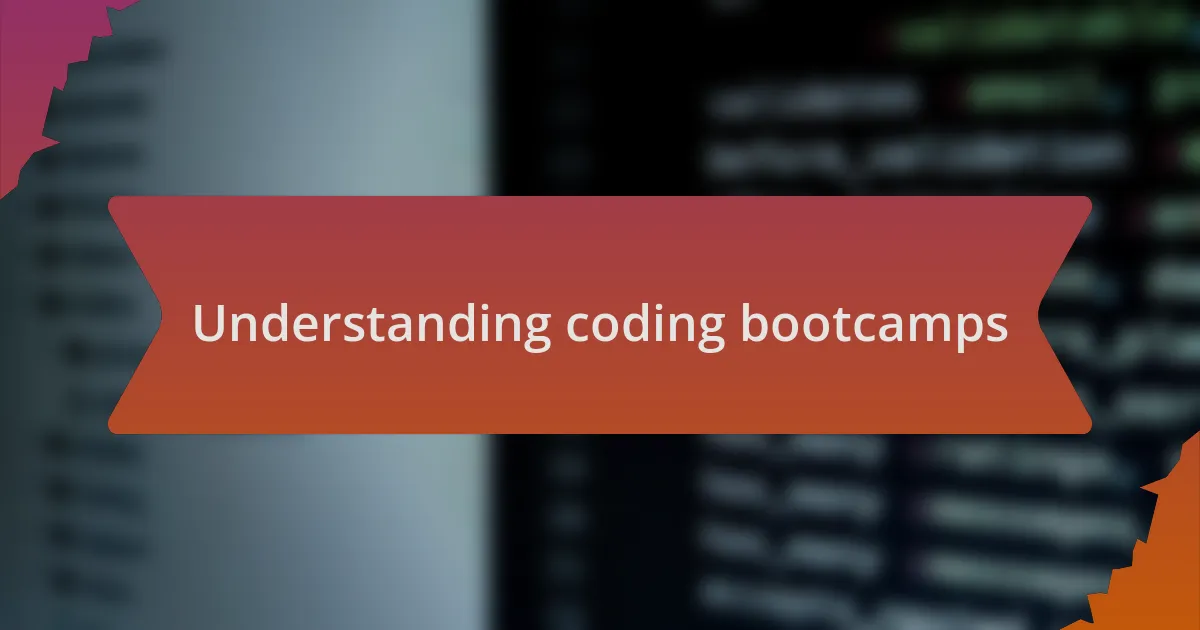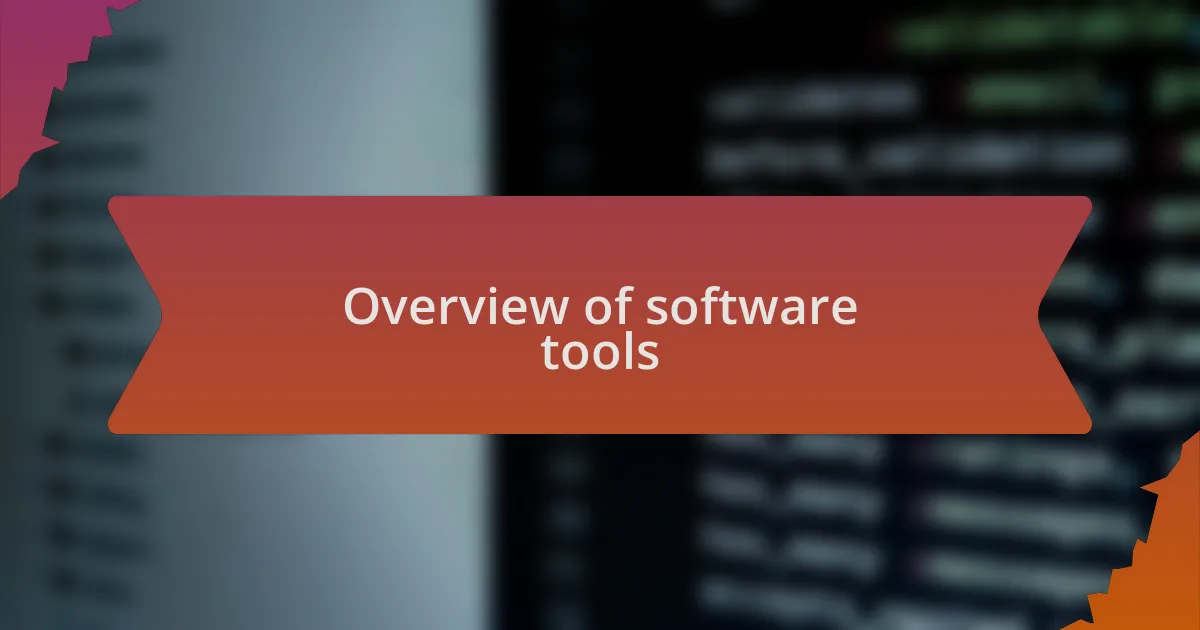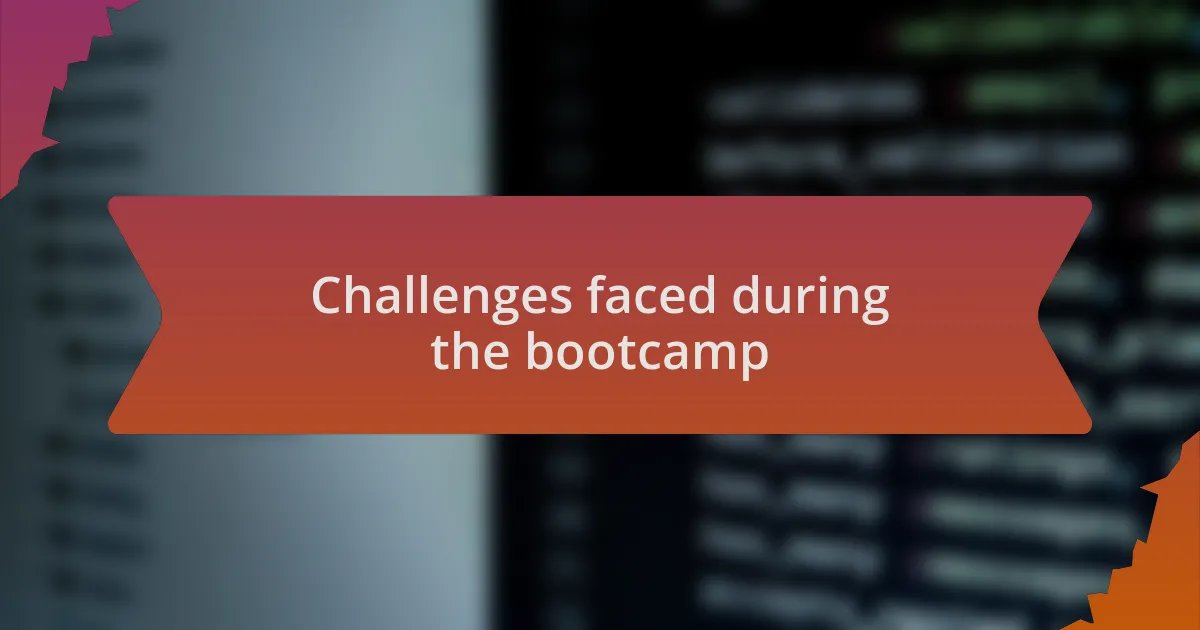Key takeaways:
- Coding bootcamps offer immersive training that emphasizes practical experience over theoretical knowledge, fostering community and collaboration among participants.
- Software tools like Git, IDEs, and project management applications play a crucial role in enhancing workflow and coding efficiency for bootcamp students.
- Challenges faced during bootcamps include adaptation to new programming languages, the relentless pace of coursework, and the emotional toll on mental health, highlighting the importance of perseverance and self-compassion.

Understanding coding bootcamps
Coding bootcamps are immersive training programs designed to teach programming skills in a short period, typically ranging from a few weeks to several months. I often liken the experience to being thrown into a fast-paced, dynamic environment where every moment counts. Have you ever felt that rush of learning something entirely new, only to realize how much there still is to grasp? That was my reality each day.
The structure of these bootcamps is quite intensive, often mirroring a full-time job with overlapping projects and deadlines. I remember late nights spent debugging code, fueled by coffee and the camaraderie of my classmates. The shared struggle fostered a sense of community that was both motivating and comforting. Do you think you could thrive in such a challenging yet supportive atmosphere?
Moreover, coding bootcamps often emphasize practical experience over theoretical knowledge. I distinctly recall engaging in hands-on coding exercises that mirrored real-world scenarios, which helped solidify my understanding. Have you considered how this practical approach might affect your confidence in tackling actual projects post-bootcamp? It truly makes a difference, turning abstract concepts into tangible skills that you can carry into your career.

Overview of software tools
When delving into software tools used during coding bootcamps, I was amazed by the variety available. From version control systems like Git to collaborative platforms such as GitHub, each tool played a unique role in enhancing our workflow. I remember the first time I committed my changes to a repository; it felt like I was taking my first step toward becoming a professional developer.
Integrated Development Environments (IDEs) were another revelation for me. Tools like Visual Studio Code and IntelliJ offered features that made coding more efficient, from syntax highlighting to debugging capabilities. I recall struggling with an error that seemed insurmountable, and with the help of IntelliJ’s built-in tools, I was able to not only fix it but understand the root cause. Isn’t it fascinating how the right tool can transform frustration into a learning moment?
Then there are project management tools like Trello or Jira, which helped us stay organized amidst the chaos. I vividly remember our team meetings, where we would strategize our tasks on virtual boards, turning chaotic ideas into actionable plans. Have you ever experienced the clarity that comes from visualizing your work? For me, these tools were essential in ensuring that my focus remained sharp and aligned with team goals, setting a strong foundation for collaboration.

Challenges faced during the bootcamp
Adaptation was one of the biggest challenges I faced during the bootcamp. I stepped into a whirlwind of programming languages and frameworks, each demanding my immediate attention. I remember feeling overwhelmed when trying to shift from Python to JavaScript. It’s like learning a new language while still getting comfortable with your native tongue; have you ever felt that rush of anxiety when encountering an unfamiliar concept?
Then there’s the sheer pace of the course, which felt relentless. Each week brought a new project that tested my understanding and pushed my limits. There were times when I would sit at my computer late into the night, grappling with a recurring bug or a feature that just wouldn’t cooperate. It was frustrating, but I learned the importance of perseverance and seeking help when needed. Asking my classmates for their insights often turned those lonely struggles into collaborative victories.
Another challenge that surprised me was the emotional toll the intensity of the bootcamp took on mental health. There were days when it felt like there wasn’t enough time to absorb everything I was learning, leading to stress and self-doubt. I found myself questioning whether I could truly keep up with my peers. Have you ever doubted your capabilities in a fast-paced environment? It’s in those moments that I learned self-compassion and the significance of celebrating small wins, helping me regain my confidence throughout the process.